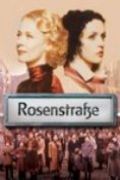
Directed by
Margarethe von Trotta
135 minutes
Rated M
Reviewed by
Sharon Hurst

Rosenstrasse
Synopsis: In present-day New York, Ruth Weinstein (Jutta Lampe) buries her husband, then goes into a protracted period of Jewish mourning which she imposes upon her non-Orthodox family. Her daughter Hannah (Maria Schrader), unable to understand her mother’s unusual behaviour, embarks on a voyage of discovery to Berlin, where she meets 90 year old Lena Fischer (Doris Schade), who tells her of the time during World War 2, when the Jewish husbands of Aryan women were imprisoned and the women protested in the streets. Gradually Hannah discovers the connection between the then young and beautiful Lena (Katya Riemann) and her mother, then a girl of seven (Svea Lohde).
It seems the film-making world never tires of stories about World War II, and especially the Holocaust. But this one is refreshingly different in that it does not rehash the atrocities. The film has a small but powerful scope, looking at a little known story of resistance, and the possibility of individuals being able to make a difference against overwhelming odds. Its central focus is a very short time period – the days between 26 February and 6 March 1943 - in a story which shows us that there were in fact some Germans, even in the military, who were prepared to stand up against the Nazis and to put their own lives at risk to protect and help others.
The time structure moves between the present-day, with Hannah both in New York and Berlin, the time of the men’s imprisonment and the women’s protest, and between the earlier times when Lena, much against her father’s will, married Fabian, (Martin Feifel), a talented violinist and a Jew.
Von Trotta cleverly uses a contrasting look in her camera work, with the present being very crisp and richly coloured, as compared to a blue-grey grainy cast to the grim streets and interiors of 1943. The recurring image of the women , their numbers growing, faces staring upwards at barred windows is a powerful leitmotif throughout. All the settings are strongly visualised, from the slick lines of New York, through to the high-rises of modern Berlin, and especially the wonderful recreation of the wartime Berlin streets along with private clubs still indulging in a decadence belying the outside events. Music when used is superb; silence even more effective.
The script and all the performances are infused with deep emotion, with many heart-wrenching, as well as inspiring, moments. The film takes a slow and measured pace to build up the most important relationships, with the characters of young Ruth, young Lena and the older Lena being especially affecting.
Rosenstrasse demonstrates that the interlinking of generations is a critical theme with continuing resonance for today’s world. How can we understand ourselves if we do not understand where our parents came from? And above all how can we ever hope to grapple with the ongoing intolerance of today’s world, if we are not constantly reminded of where such things have led to in the past?
Want something different?





